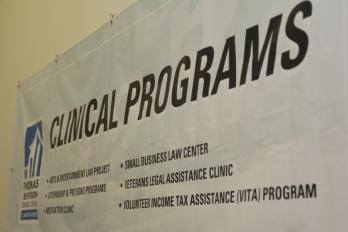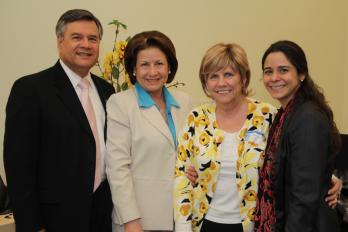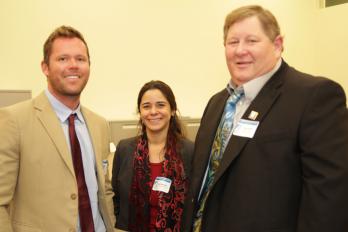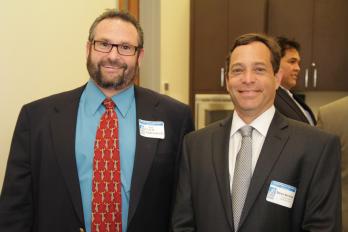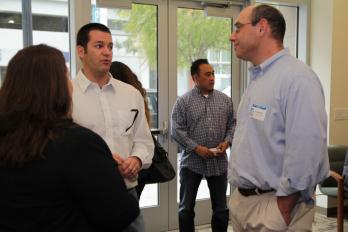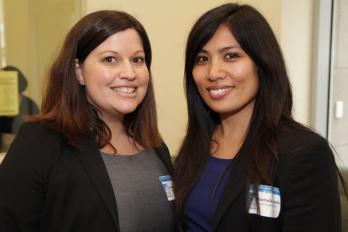TJSL Free Clinics Have Open House
April 19, 2012
Thomas Jefferson School of Law has several clinical programs, and they all teamed up for an open house event on April 18. The Small Business Law Center, the Arts and Entertainment Law Project, the Mediation Program, the Veterans Legal Assistance Clinic, the Volunteer Income Tax Assistance (VITA) Program, and the Externship and Pro Bono Programs, all share a beautiful new suite of offices on TJSL’s new campus.
The invited guests were the community supporters of the clinics, their clients, the students who work in the clinics and their faculty directors. For many of the community supporters, such as U.S. Small Business Administration (SBA) District Director Ruben Garcia, it was their first chance to visit the clinics.
“It’s a great opportunity for us to have a resource partner such as the Small Business Law Center,” Garcia said. The SBA refers clients to the SBLC, which is the newest of TJSL’s free clinics.
“This is an amazing asset for metro San Diego,” said clinic supporter Juan Gallegos, of Gallegos & Associates, a community affairs firm. Gallegos has referred several clients to the SBLC and will continue to do so, enthusiastically.
Guests had the opportunity to speak with everyone involved in the clinics, including clients, students and faculty, and to enjoy wine, cheese, and hors d’oeuvres in a very convivial setting.
Superior Court Commissioner Adam Wertheimer, who hears Veterans Clinic family court cases at the annual Stand Down event, came to see the clinic first hand, and brought a slide show presentation of many of TJSL’s students representing veterans before him.
The TJSL clinics are all thriving, and collectively have helped hundreds of clients, most from underserved population groups.
TJSL Dean Rudy Hasl feels that the clinics offer a very important public service and he has been highly pro-active in developing and supporting the clinical programs.
“The School has developed a set of clinical programs that provide an excellent hands-on experience for our students and yet meet very real legal needs of clients within the San Diego area,” said Dean Hasl. “A review of existing programs that provide legal services led us to choose particular types of issues to be addressed based on the lack of available services in the area.”
About The Clinics:
Small Business Law Center: TJSL students, under the direct supervision of California licensed attorneys, provide legal assistance to micro-entrepreneurs, small businesses, and non-profits that do not have the means to hire an attorney to advise them. Director: Professor Luz Herrera
Arts and Entertainment Law Project: Provides free legal services for low-income artists, actors, dancers, writers, musicians, filmmakers, and related non-profit organizations, as part of the SBLC. Director: Professor Jeff Slattery
Veterans Legal Assistance Clinic: The Thomas Jefferson School of Law Veterans Legal Assistance Clinic provides limited legal assistance, as well as full service legal representation, to the residents and alumni of Veterans Village of San Diego. Director: Professor Steve Berenson
The Mediation Program: Our students get intensive training in mediation and then make their services available to clients or disputants at the South County and East County Small Claims Courts. As mediators, the students apply the communication, listening and facilitation skills they have acquired to bring about settlements. Director: Professor Ellen Waldman
Volunteer Income Tax Assistance (VITA): Operated each spring by the law school’s Tax Law Society, a student organization. The TJSL VITA program is an IRS program that provides a valuable community service in the form of free income tax return preparation.
Externship and Pro Bono Program: Externship program offers great opportunities to TJSL students for hands-on legal experience and academic credit at the same time, as well as a chance to earn honors for pro bono work in the community for underserved populations. Director: Professor Judybeth Tropp
